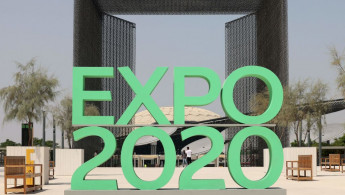Labour rights abuses at Dubai's Expo 2020 detailed in new report
The legions of workers who built Dubai’s extravagant Expo 2020 site and keep it running face exploitation, grim conditions and a wide range of labour abuses, according to a new report released on Wednesday by a London-based labour rights group.
The report by consultancy Equidem also said that the United Arab Emirates government had failed to demonstrate that its commitments to worker welfare at the multibillion-dollar Expo had corrected, let alone identified, rights violations.
It comes after The Associated Press published an investigation based on interviews with over two dozen Expo workers about their grievances, including their payment of illegal recruitment fees, employers’ confiscation of passports and inadequate food. That article also drew on Equidem’s previous research into the conditions of construction workers a year before the world’s fair opened, when workers said they were denied wages for months amid the coronavirus outbreak.
“I was honestly shocked to see just how widespread the non-compliance is and how much forced labour is happening,” Mustafa Qadri, an author of the Equidem report and the group’s executive director, said in an interview. “It raises questions about how effective the labour system is in the UAE, because Expo is the most high-profile project in the country.”
Expo organisers did not respond to requests for comment about the report. Emirati authorities also did not respond to requests for comment.
The 37-page Equidem report — based on nearly 70 interviews with migrant workers at Expo over three months last fall — represents a comprehensive analysis of the labour situation at the world’s fair. The giant international event has offered the UAE a key opportunity to burnish its credentials as a globalised place attractive to tourists and investors.
Foreigners outnumber locals nearly nine to one in the UAE. Undergirding the machinery of daily life is the country’s labour sponsorship system, which employs millions of low-paid workers from Africa, the Middle East and Southeast Asia and has long drawn accusations of mistreatment for failing to ensure fair wages, hours and living conditions.
The Equidem report said the majority of workers interviewed were forced to pay illegal recruitment fees to get their jobs, often exceeding their monthly pay. Despite a ban on the practice at Expo and in the country, the report said many employers were aware that workers paid steep fees to recruiters in their home countries and did not reimburse them, creating a situation of debt bondage.
The Equidem report documented workers who were not provided with employment contracts or could not read them because they were not translated into their native language, as required by law.
Some received partial pay or had to wait over a week to receive their wages each month, which included their food allowance. Workers were frequently denied overtime pay, termination benefits and promised bonuses. Employers in some cases slashed salaries up to 75 percent as the pandemic battered the economy, workers alleged.
“The way they treat the staff is like slaves,” one worker at the Crab Chic cafe overlooking Expo's iconic dome told Equidem researchers. “It’s very tiring. I work from early in the morning till evening. … Never have I received overtime payment.”
Most workers interviewed surrendered their passports to their employers and none of them could unconditionally retrieve them, despite Emirati laws that forbid companies from confiscating worker’s identity documents.
Even when the United Arab Emirates is on its best behavior for Dubai's Expo 2020, migrant workers face "employers confiscating their passports, broken promises on wages; crowded and unsanitary living conditions"; and up to 70-hour workweeks in brutal heat. https://t.co/NZO32JyfJJ pic.twitter.com/GvFmSAOF3K
— Kenneth Roth (@KenRoth) November 30, 2021
Workers also said they were targets of discrimination, describing how their race dictated their treatment and duties on site.
“Asians are given the heavy work and less pay while the Europeans and Arabs are given lighter roles with lots of income,” said one interviewee. “The Asians are the first to lose their jobs.”
Racism remains a deeply rooted issue in the UAE, where slavery was not formally abolished until the 1960s and dark-skinned workers from Africa and South Asia routinely report receiving lower wages than their light-skinned colleagues today.
Expo workers told researchers that they feared reprisals, including dismissal and deportation from employers and police if they spoke up about labour conditions and harassment, the report said. Forming unions and mobilising for better treatment remains criminalised in the autocratic UAE.
With Dubai in the spotlight over the world fair that seeks to draw 25 million visits, authorities had promised to beef up efforts against the persistent practice of forced labour. Expo established guidelines laying out strong protections for worker rights. The UAE deploys company inspectors to ensure workers haven't been exploited.
Yet, none of the employers featured in the report appeared to be in compliance with the event's standards.
“There were so many international consultants hired. Millions and millions have been spent,” Qadri said. “It raises the question, are they really serious about addressing forced labour? Or is that just (window) dressing on a really bad situation?”





 Follow the Middle East's top stories in English at The New Arab on Google News
Follow the Middle East's top stories in English at The New Arab on Google News


